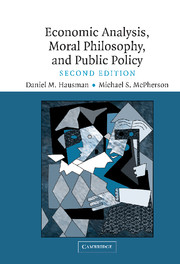Book contents
- Frontmatter
- Contents
- Preface
- INTRODUCTION
- I RATIONALITY AND MORALITY
- II WELFARE AND CONSEQUENCES
- III LIBERTY, RIGHTS, EQUALITY, AND JUSTICE
- IV MORAL MATHEMATICS
- CONCLUSIONS
- 15 Pollution Transfers and School Vouchers: Normative Economics Reconsidered
- 16 Economics and Ethics, Hand in Hand
- Appendix: How Could Ethics Matter to Economics?
- Glossary
- References
- Index
15 - Pollution Transfers and School Vouchers: Normative Economics Reconsidered
Published online by Cambridge University Press: 06 July 2010
- Frontmatter
- Contents
- Preface
- INTRODUCTION
- I RATIONALITY AND MORALITY
- II WELFARE AND CONSEQUENCES
- III LIBERTY, RIGHTS, EQUALITY, AND JUSTICE
- IV MORAL MATHEMATICS
- CONCLUSIONS
- 15 Pollution Transfers and School Vouchers: Normative Economics Reconsidered
- 16 Economics and Ethics, Hand in Hand
- Appendix: How Could Ethics Matter to Economics?
- Glossary
- References
- Index
Summary
Both Lawrence Summers's argument that the World Bank should facilitate the transfer of polluting industries to poor countries and the efficiency argument for school vouchers are instances of standard welfare economics. If parents are permitted to choose among competing schools then their preferences will be satisfied at least as well as in a state-sponsored system, and competition among schools will induce cost savings and improvements in quality. Concerns about the distributional consequences can be addressed by a system of vouchers, which can be as generous or stingy toward those who are poor as the citizenry wishes. Similarly, the massive inequalities in incomes, wages, and environmental quality between rich and poor countries and the fact that pollution damage is not a marketable good create opportunities for Pareto improving trades (or industry relocations) between rich and poor countries, which the World Bank can facilitate. Uncompensated transfers of pollution to LDCs (like the simple elimination of public support of education) cannot be justified in this way, since doing so would not be beneficial to all parties. Yet even uncompensated pollution transfers would apparently represent potential Pareto improvements and would be viewed favorably from the perspective of cost–benefit analysis.
We went on to suggest a number of objections to these arguments. In addition to distributive concerns, voucher plans must be responsive to the paternalistic and political reasons why governments support education. In Chapter 2 we suggested that, although these considerations do not necessarily defeat the argument in support of a voucher system, they do support constraints on its structure.
- Type
- Chapter
- Information
- Economic Analysis, Moral Philosophy and Public Policy , pp. 259 - 273Publisher: Cambridge University PressPrint publication year: 2006



